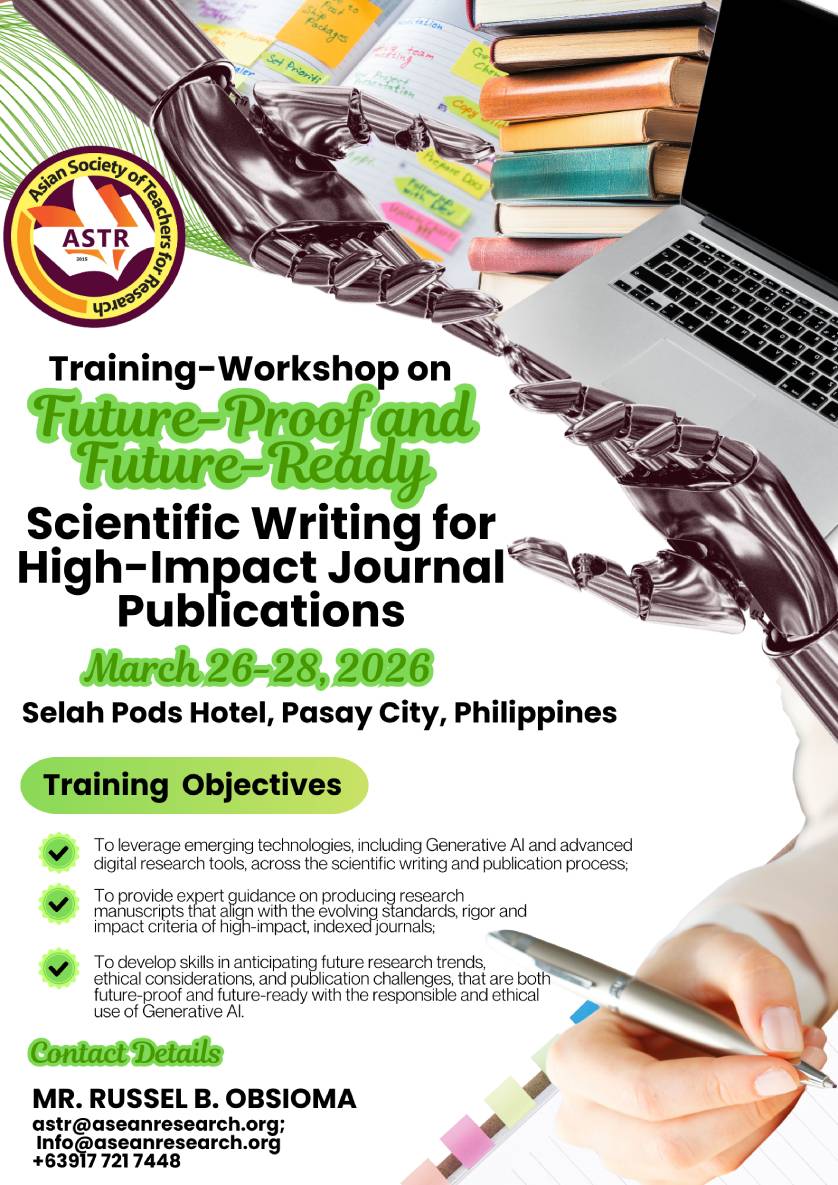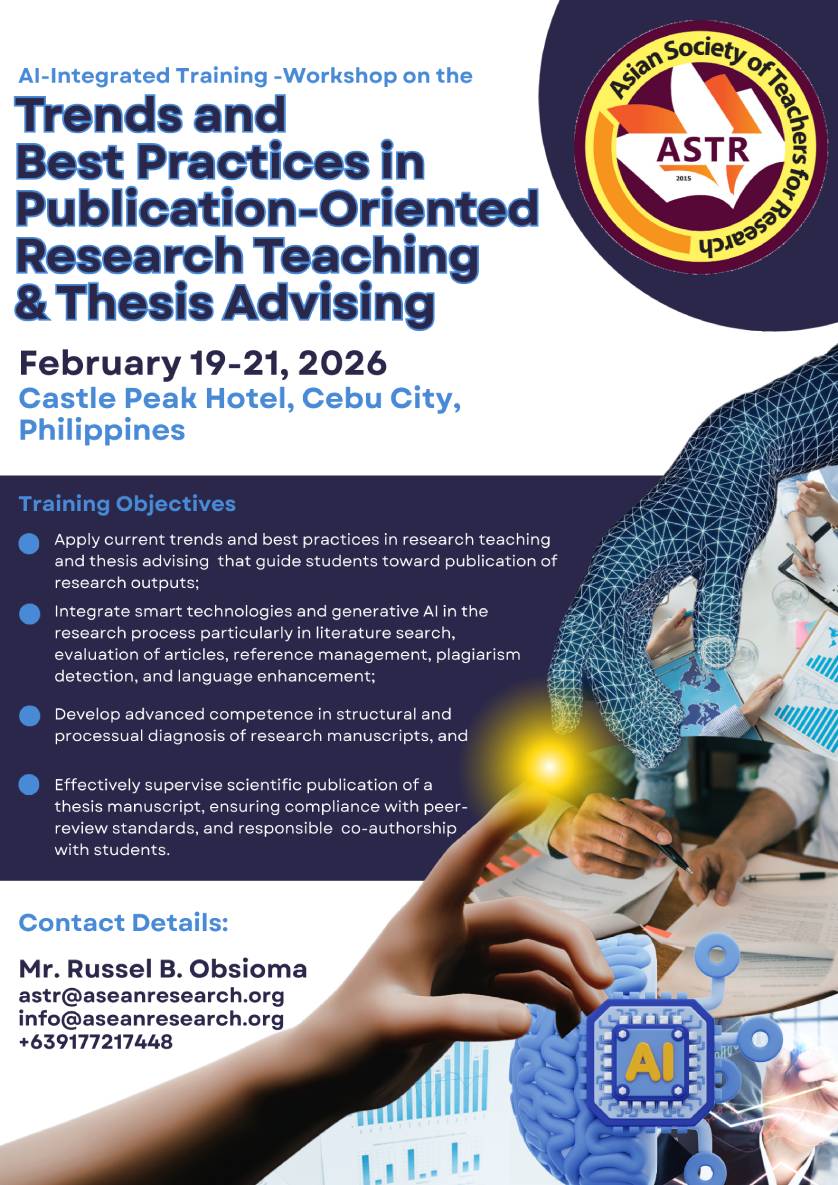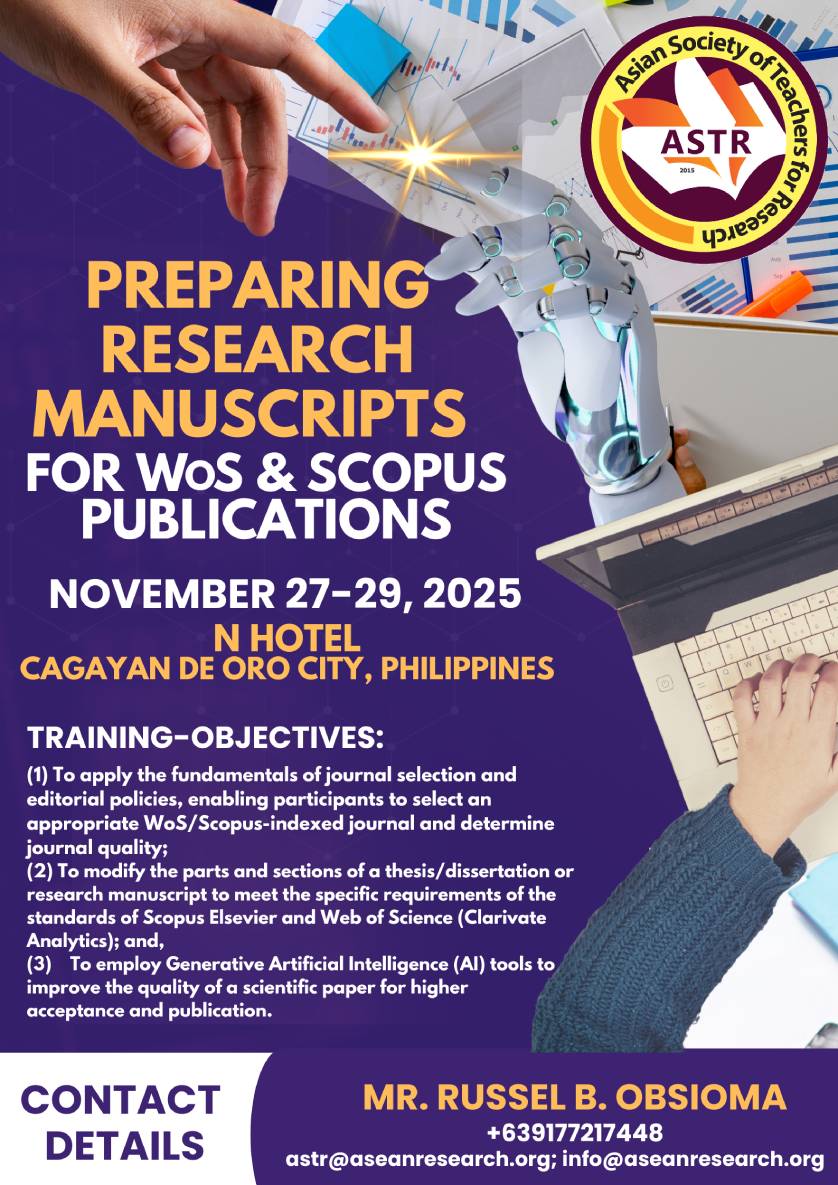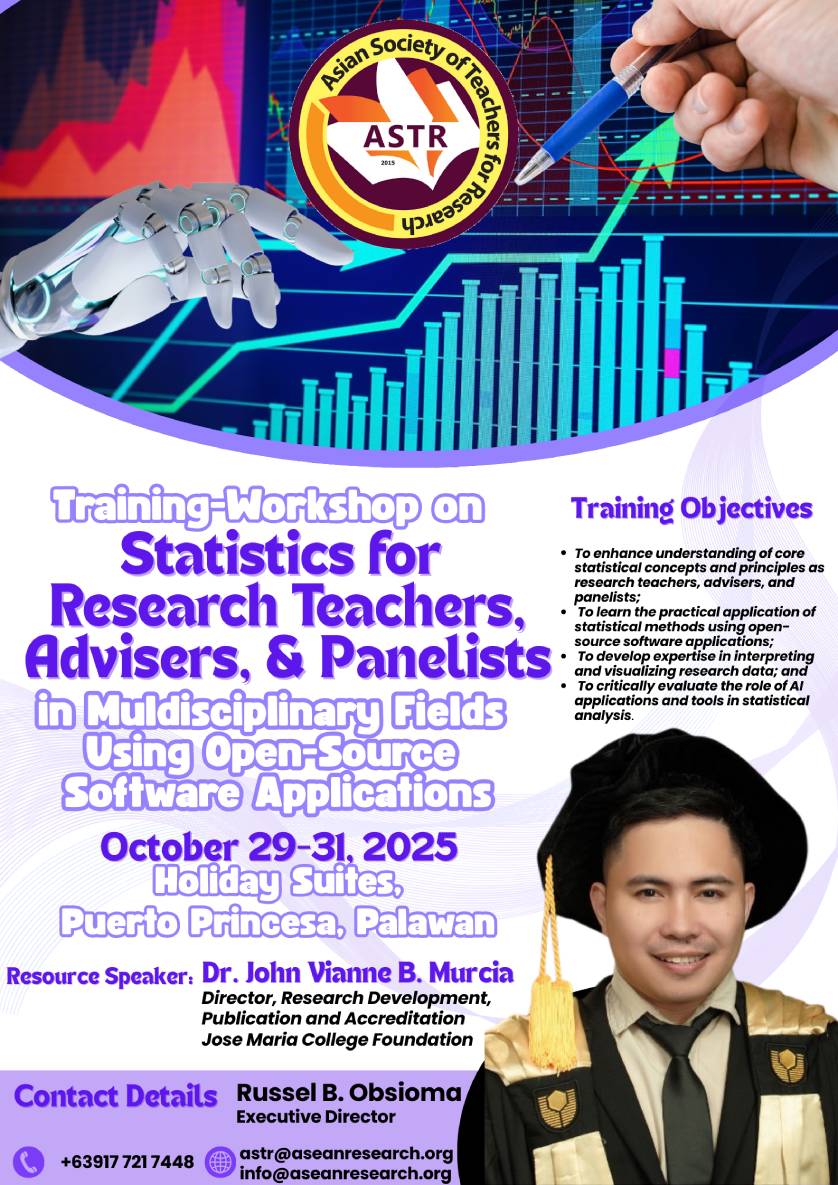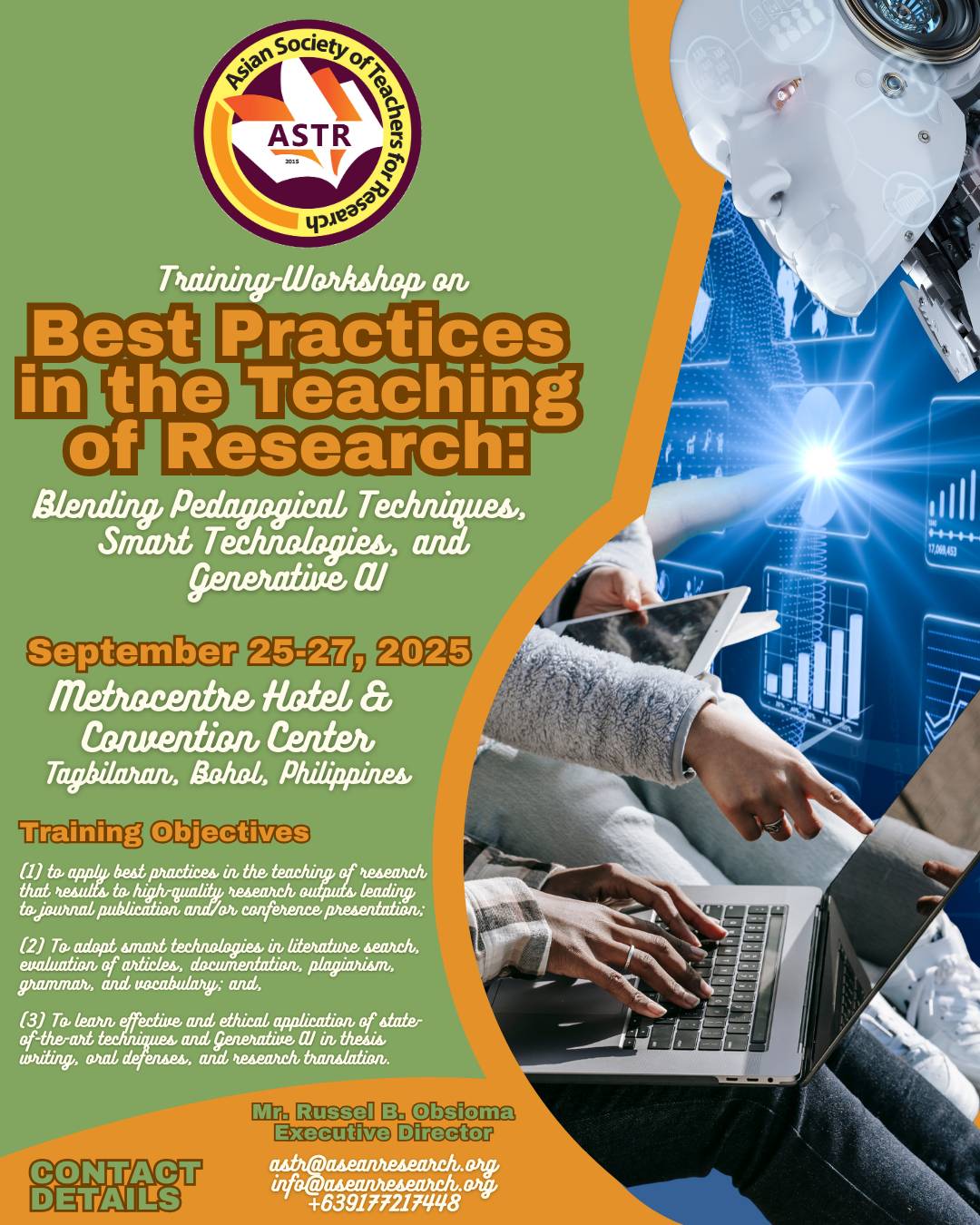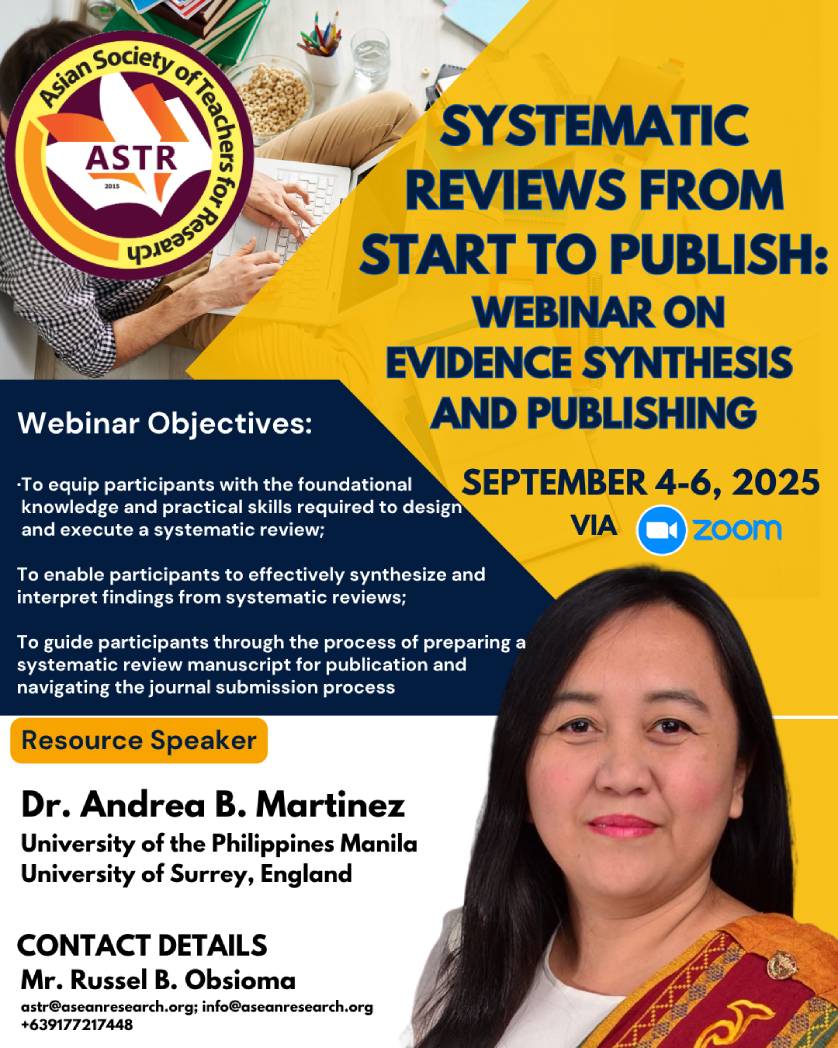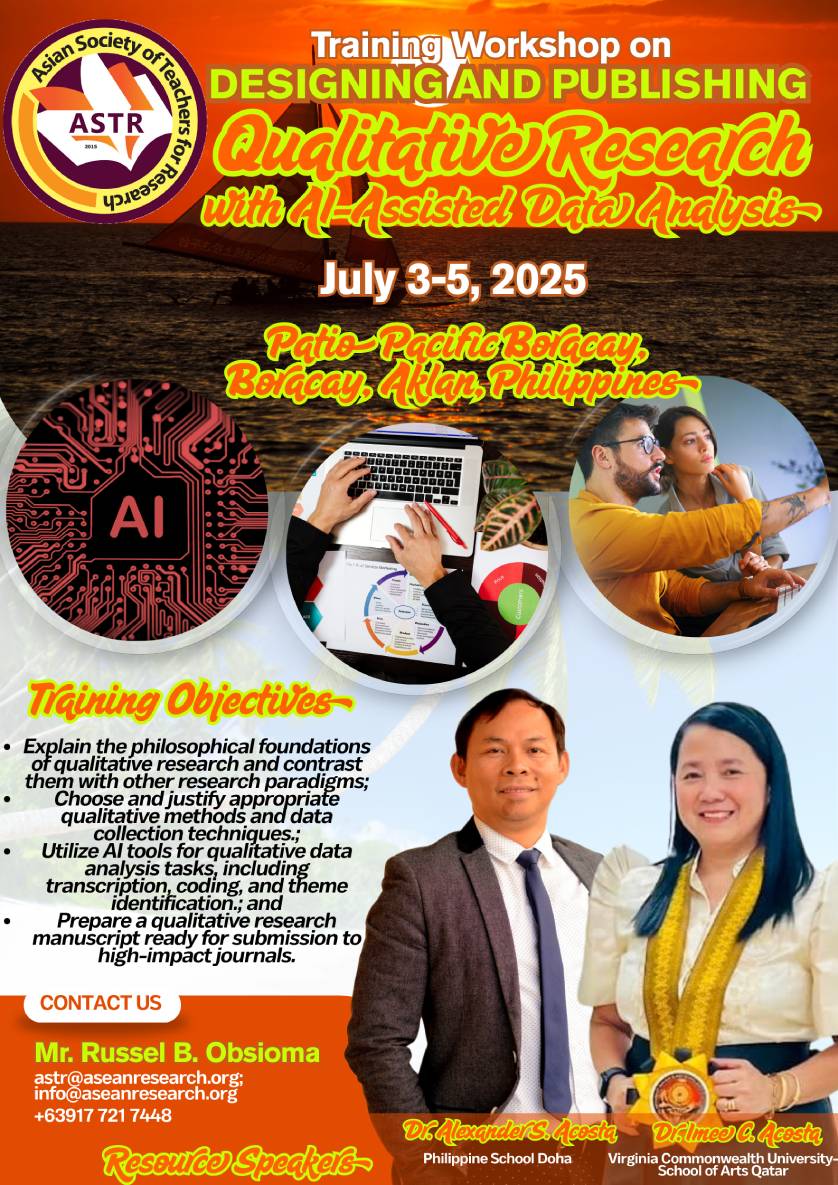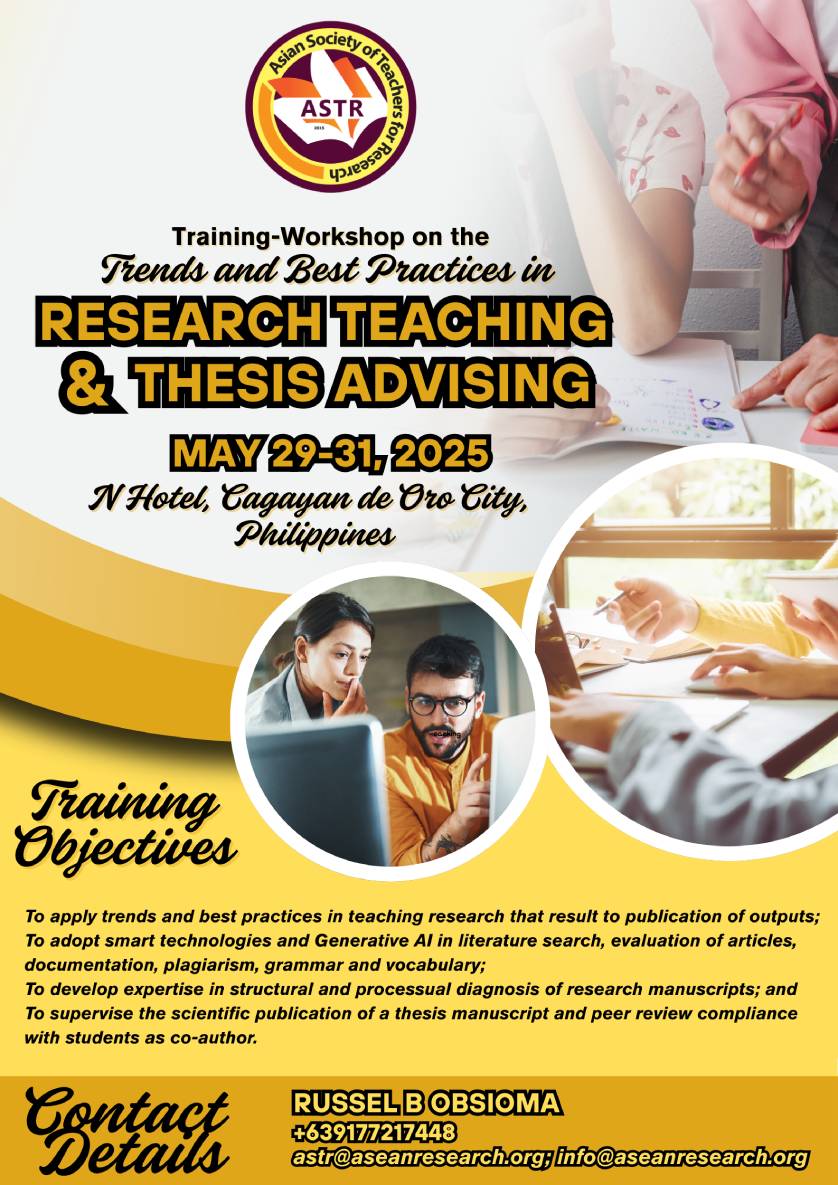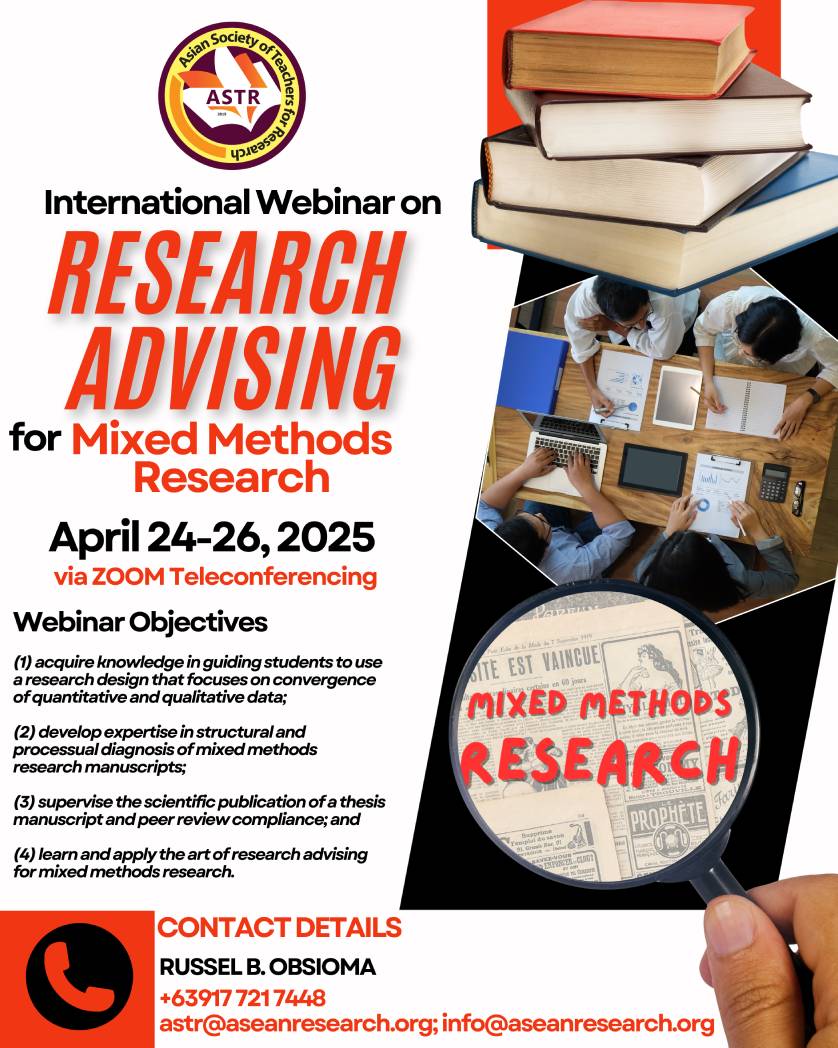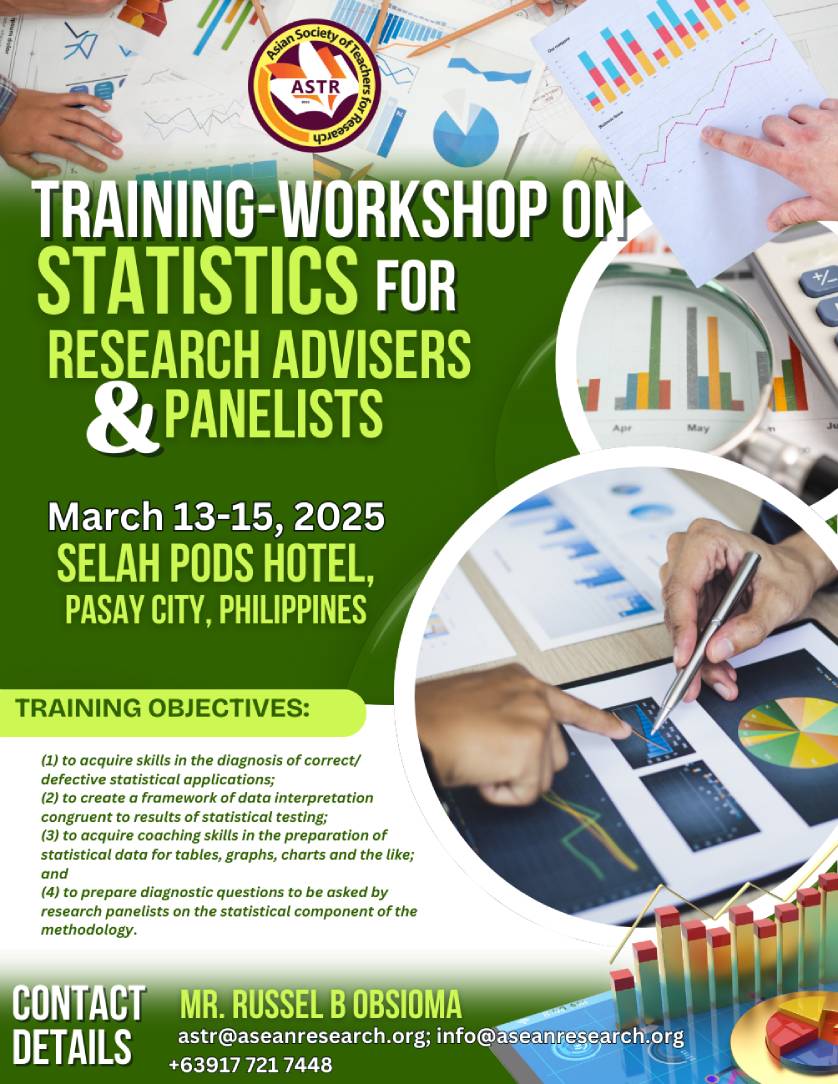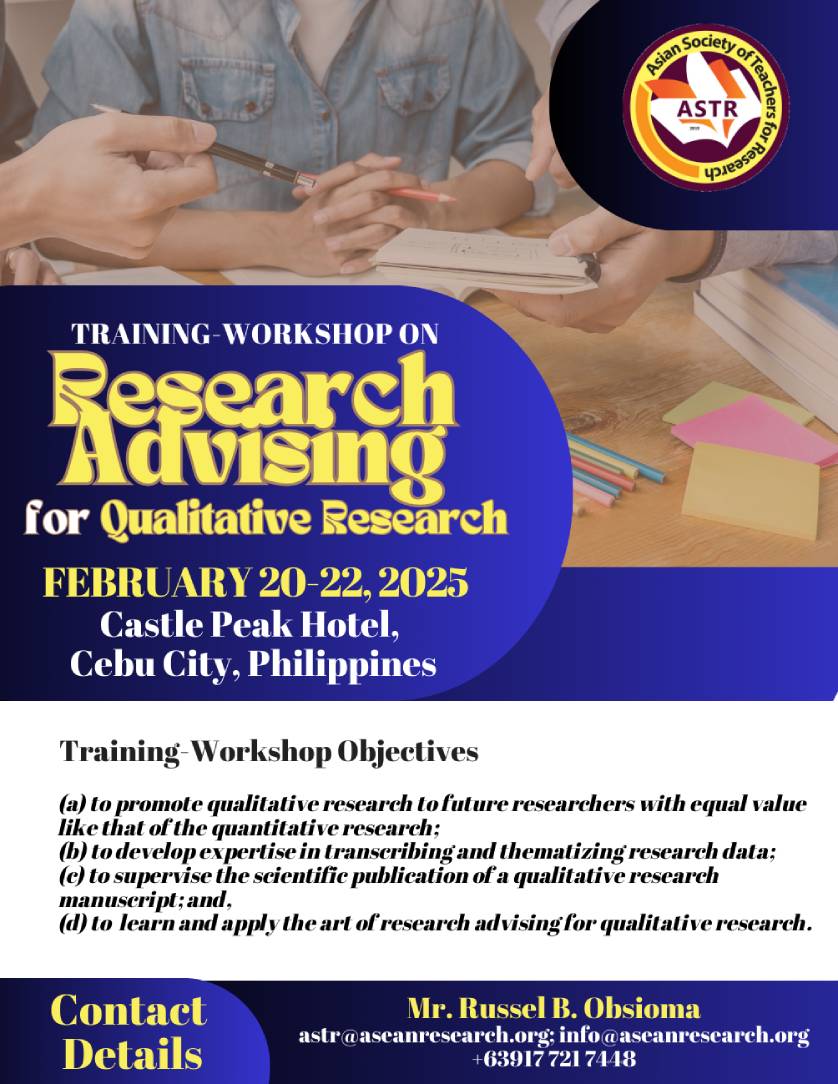Requiring a balance between ethical, and enduring scholarly principles with responsiveness and adaptability to research innovation, future-proof and future-ready scientific writing answers to the rapidly evolving scholarly ecosystem exacerbated by the rise of Generative AI. Future-proofing ref
Moving away from mere rote compliance and more towards cultivating new knowledge, the future of research teaching and thesis advising views theses and dissertations as not just hardbound volumes to be forgotten on a library shelf but journal articles that contribute to a global conversation. The 21st century research teacher and thesis adviser understands that collaboration is the new research currency; encouraging students to build networks of peers, of consultants, of institutions towards research completion and article publication. With the recent and rapid emergence of Generative AI, research teachers and thesis mentors must be able to train and guide their students and advisees to strike a balance between human effort and machine efficiency; reminding students to use Generative AI as tool to simplify processes, not crutch to sterilize the thought. Redefining their role from gatekeepers of tradition to catalysts of innovation, how can research teachers and thesis advisers guide students toward the publication of their research outputs in reputable journals?
Standing as foremost gatekeepers of scholarly quality and visibility, Clarivate Analytics' Web of Science (WoS) and Elsevier's Scopus confers credibility, influence, and prestige upon the journals and articles they list. In the Philippine higher education landscape, there is a growing clamor for faculty researchers to publish in these two major indexing databases driven by the need to elevate the country's research visibility, enhance institutional rankings, and align with international standards of academic excellence. Recognizing the role of intellectual capital in a knowledge-based economy, national research agencies in the Philippines have institutionalized the push for international publications in scientific journals indexed in Clarivate Analytics' WoS and Scopus Elsevier. However, despite institutional mandates, many Filipino researchers face challenges in meeting the standards of these major indexing databases. A movement aligned towards global and national imperatives, how can one publish their research manuscript that reflects a deep understanding of academic writing conventions, ethical publication practices, methodological rigor, and strategic alignment with these academic journal indexing giants?
In an era defined by the rapid convergence of digital technologies, the landscape of academic research has undergone a profound transformation. At the heart of this evolution lies a powerful trinity: the availability of robust statistical methodology, the democratizing influence of open-source software, and the transformative capabilities of artificial intelligence. For research teachers, advisers, and panelists in today's multidisciplinary environment, a deep understanding of how this trifecta interacts is not merely advantageous; it is foundational to producing, guiding, critiquing, and evaluating high-quality scholarly work. Requiring more than traditional statistical knowledge, the ability to navigate this new paradigm also demands practical technological proficiency with available statistical tools and a critical AI sensibility for both data analysis and research ethics. With an academic landscape that demands a unique blend of statistical literacy, technical proficiency, and critical AI capability, how can one become a research teacher, adviser, and/or panelist that guides students in producing meaningful, rigorous, and impactful research work?
Blending fundamental principles of scholarly inquiry, technological praxis to digital tool proficiency, and the critical prudence to Generative AI literacy, effective research pedagogy in the modern academic landscape is an amalgamation of time-tested teaching methods, state-of-the-art technologies, and ethical use of Generative AI. By empowering students with a comprehensive and integrative toolkit that includes transformative pedagogy, digital literacy, and ethical AI capability, research teachers can guide them toward producing high-quality research outputs that stands the test of rigorous academic scrutiny and meaningful public engagement. Given the profound transformation of the research landscape driven by digital tools and artificial intelligence, how must the traditional teaching of research adapt to equip students with both foundational methodological knowledge and digital competence to leverage new technologies?
Guiding researchers establish the state of existing knowledge through the appraisal and synthesis of research evidence, systematic reviews stand as a cornerstone of evidence-based scholarship. Systematic reviews involves explicit data collection, careful evaluation and scientific examination of often related but separate research studies. A rigorous and multifaceted endeavor that demands meticulous planning, diligent execution, and transparent reporting, how can one design and publish a well-structured systematic review that advances scientific knowledge and address critical needs across various fields?
In an era increasingly driven by data and artificial intelligence, understanding, applying, and interpreting statistics meaningfully is paramount for both research teachers and data analysts. Where traditional statistics instruction hinges on rote memorization of formulas and procedural steps, meaningful statistics pedagogy offers a transformational shift fostering a robust conceptual foundation that transcends mere calculation. Introducing new complexities in its use in the statistical domains while significantly streamlining the analytical process, Artificial Intelligence tools should be critically examined to understand its limitations in identifying correlations and making predictions. For research teachers, it is molding students capable of not just using AI in their data analysis but training them to critically interrogate their results and understand its implications. Similarly, for data analysts, it is ensuring that artificial intelligence is harnessed ethically and responsibly; maintaining the integrity and reliability expected for data-driven decision-making. Emphasizing the “why” behind the “how,” how can one become research teachers and data analysts who not only cultivate statistical literacy but also, the critical thinking skills of their students and mentees?
Seeking depth over breadth, stories over numbers, and nuance over trends, qualitative research is a painstaking journey of immersion in data, reflective coding, and iterative theme development, crafting a compelling narrative that honors human experiences, perspectives, and social phenomena. In the evolving landscape of research technology, designing qualitative research in an AI-assisted era requires an understanding of Generative AI's capabilities not as a replacement for human insight, but as a powerful augment. Crucially, the heart of qualitative research design—formulating incisive research questions, selecting appropriate qualitative research methodologies, defining applicable sampling strategies, and establishing robust ethical protocols—remains firmly in the researchers’ domain.
Wielding pedagogy as a craft, technology as an ally, and mentorship as a mission, research teachers and thesis advisers are at the heart of the students’ research journey; shaping the direction, depth, and destiny of their scholarly pursuits. A process so layered and dynamic, research teaching and thesis advising guide and empower students in not just leveraging their research ideas into robust insights, but also transforming scientific inquiries into sustainable impact. Blending expertise with empathy, structure with flexibility, and theory with practice, how can one become an effective and conscientious research teacher and/or thesis adviser guiding students to navigate the complex terrain of the research process: from topic conceptualization to manuscript publication?
A delicate balancing act that blends the precision of numbers with the depth of narratives, research advising for mixed methods research demands a comprehensive understanding of both quantitative and qualitative methodological frameworks, data collection techniques, and integration strategies. Research advisers serve as navigators in the student’s research journey fostering their methodological expertise, critical thinking skills, ethical rigor, and effective communication prowess; helping research advisees translate diverse data into coherent insights. Transforming hurdles into opportunities for deeper inquiry and innovation, how can one become a research adviser for mixed methods research that cultivate students who can bridge paradigms, craft insightful analyses, and contribute significantly to the evolving landscape of knowledge?
The backbone of data analysis, statistics provides a structured framework to collect, organize, interpret, and present data effectively. Research advisers rely on statistical tools to identify potential biases, confounding variables, and limitations in the research, leading to more robust and credible outcomes. Furthermore, panelists with statistical proficiency can better understand, provide critical evaluation, and interpret the presented results, ensuring that the conclusions drawn are accurate and meaningful. With advancements in AI, data visualization, and statistical software, how can research advisers and panelists enhance their statistical literacy to uphold academic excellence and contribute to the development of a robust, impactful student research?
With institutions giving more premium on quantitative research as evidenced by research pedagogy and praxis more centered on the descriptive quantitative research, students pursuing qualitative theses and dissertations often encounter significant challenges and obstacles on their path to completion. Consequently, qualitative research advisers find themselves navigating a complex duality: serving as gatekeepers of academic rigor and quality in their students' scholarly work while simultaneously acting as mentors and coaches, fostering the development of their students’ skills, confidence, and identity as qualitative researchers. Given the critical and nuanced responsibilities of ensuring quality and guiding qualitative research instruction, what strategies can one employ to excel as an effective qualitative research adviser and facilitate the successful publication of student research?

